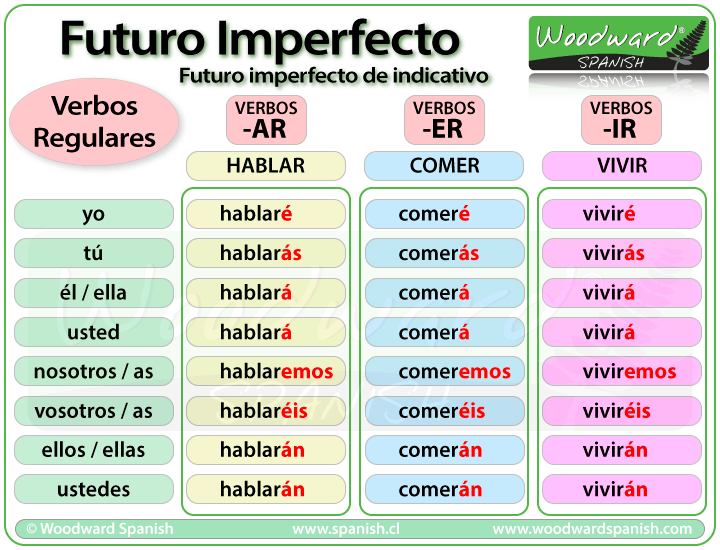Spanish grammar course: The Irregular future tense verbs.

The last class, we talked about the future tense. I said that the endings of the verbs are the same for all the infinitive verbs. They are regular verbs. Let´s answer the exercise suggested in the last class and we’ll continue with the irregular future verbs.
Exercises: write sentences in future tense, use the following verbs, and follow the example.
Limpiar (to look) Yo limpiaré el carro
Escribir / manejar / defender / caminar / leer / ir / estudiar / cenar
| Infinitive Verb | Sentence |
|---|---|
| Escribir (to write) | Yo escribiré un libro |
| Manejar (to drive) | Ella manejará |
| Defender (to defend) | Ustedes defenderán sus derechos |
| -------- | --------- |
| Caminar (to walk) | Yo caminaré por el parque |
| Leer (to read) | Ella leerá el periódico |
| Ir (to go) | Nosostros iremos al cine |
| -------- | --------- |
| Estudiar (to study) | Tú estudiarás inglés |
| Cenar (to eat dinner) | Ellas cenarán juntas |
Do you remember the endings of the regular future verbs explained the last class? look at the tablebox above and compare. This is the review:
| Yo | -é |
| --------|---------|
| Tú | -ás |
| Ella, él, eso | á|
| Nosotros | -emos |
| --------|---------|
|Ustedes, ellos, ellas | -án |
The ending vowels are accented, except the verb conjugated for ‘we’ (nosotros)
The irregular future verbs has the same endings of the regular ones. The irregular future form changed a little by adding or a taking out a letter, let’s see some examples:
Examples:
caber (to fit)
| Yo | cabré |
| Tú | cabrás |
| Ella, él, eso | cabrá|
| Nosotros | cabremos |
|Ustedes, ellos, ellas | cabrán |
Decir (to say)
| Yo | diré |
| Tú | dirás |
| Ella, él, eso | dirá|
| Nosotros | diremos |
|Ustedes, ellos, ellas | dirán |
Notice the little change that the infinitive verb suffers.
Exercises: write sentences in future tense, use the following verbs, and follow the example.
Venir (to come) Yo vendré el lunes
Tener / caber / poner / querer / saber / valer / decir / haber
Well that's all friends, in the next post, we will continue with more classes to learn the grammar of Spanish. Review all classes and practice the exercises given. Any questions make your comment. Until next time. Next post in 72 hours.
